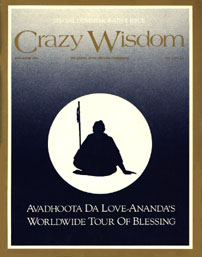
The Journal of the Free Daist Communion, Vol 5, NO 6-8, June/August 1986
“My Distress Is Intended to Instruct Devotees”
The conventional reponses to criticism are guilt, anger, and emotional collapse, all of which are particularly inappropriate in relation to the Heart-Master. In our guilt we are childish, withdrawn, and thus unresponsive. In our anger we are adolescent, resistant, and even abusive. And in our emotional collapse we play out the “failed case”, frozen in our assumption of unlove. Such conventional reactions are the essence of non-response. They betray a lack of self-understanding and a failure to see the true Nature of the Heart-Master. His Distress, His Anger, and His Criticism are spontaneous expressions of the Divine Siddhi at Work to purify all that is not perfectly aligned to Itself. The point of His Criticism is to Instruct devotees, to move them toward a change of action—not to punish them or make them feel bad.
The Great Tradition is filled with historical examples of the transforming Criticism that is a necessary part of the Adept’s Work. In the Judeo-Christian tradition, the Old Testament prophets set straight ths tribes of Israel, and Jesus Worked to realign the people of Palestine in the “Sermon on the Mount”. The Zen Buddhist Master’s ’stick”, with which he administers lessons in the form of blows to disciples, is a familiar Teaching “tool” of Zen. In particular the Masters of the Rinzai school are noted for their ability to Awaken monks by the apparently violent means of shouts and blows. And the play between Marpa and Milarepa in Tibetan Buddhism is perhaps the epitome of this form of the relationship retweet Guru and devotee, in which Marpa. by means or repeated rebukes, purified Milarepa of his karmas.
In our time, Da Love-Ananda’s Criticism, whether we discover it in the critical Argument presented in the literature or receive it via the Master’s direct Communication, is an immediate and potent Means of His Grace. It carries the Radiant Transmission that will transform our lives, if only we will respond. Master Da once explained, “My anger is only a modulation of the same Force and Blessing I always give my devotees.”
While devotees’ angry reactivity and guilty collapse misdirect the Force of Da Love-Ananda’s Criticism, neither should we refuse to feel His Criticism at all, defending ourselves against it be discounting His Distress as merely His “Play” with devotees. To understand the Heart-Master’s Criticism as the Force of Blessing is to accept it in the spirit of love and gratitude, allowing cur hearts to be wounded by the Heart-Master’s benign Sword of Truth and accepting the purifying heat of the Adept’s Divine Fire. As Da Love-Ananda said in 1979:
I allow you to practice from day to day, but if I come upon you personally every now and then and burn the brush out of you—do a little defoliating—you should know why. This fieriness that I bring to you to correct and transform you is nothing compared to the latent energy of the great cosmos and all that it is willing and able and ready and even intending to do to you. What I bring to you is just a glow, a kind of warmth. It is even comfortable.
The fire of the universe, however, is all-consuming. When the universe burns you up you will have no complaints to make—you will not be there to complain! The fieriness that I bring to you only serves your Enlightenment. Therefore, the fact that I may seem to be angry with you in some moment is not a reflection of your karma. It is a form of my Work to Awaken you, to quicken you, to move you out of the pattern of mediocre practice. The import of it is that you must practice from the heart, with a will, from moment to moment. Only your moment to moment practice is significant. You must always be prepared for me. You must always conduct the service you perform in your daily life as if you were serving me bodily and personally. Your daily activities may not seem to have anything directly to do with me, but in fact they always have something to do with me, absolutely and directly.
Da Love-Ananda’s Criticism is invariably directed at our failure to practice and to receive Him in every moment. It is certainly appropriate to feel the wound of our failure and our betrayal of the One we love. Likewise, it is necessary to feel the reality of our narcissistic existence, which is that we do not love and do not serve. However, to feel only this much is to become the “failed case”, unable to respond.
The “secret” of our true response is hidden in Da Love-Ananda’s Distress: If we feel His Criticism completely, we feel Him. In that event, we are alive in Satsang, in touch with the “True Heart-Master”, the Form of the Divine Person Incarnate in our midst, who is here to restore Humor and the Realization that nothing that arises has any ultimate implication.